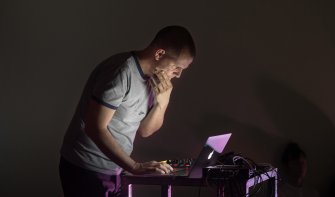Plane/Talea #7 (Regular Measures)
Alessandro Bosetti
Di fronte a certune difficoltà ha cercato di impiantare dentro di se delle ruote lulliane. Ha cercato di trasformarsi in un automa, in una macchina o nella somma dei suoi componenti e delle sue memorie. In tale intento ha fallito, e il suo sé gli è sfuggito comunque in un altrove che non gli è dato conoscere. Ora le ruote lulliane girano a vuoto come giraventi e caleidoscopi, nello ruotare fanno un rumore gradevole, almeno più gradevole di quello dello ruotare di una ruota di bicicletta. Le ruote avrebbero dovuto fissare in un numero finito tutti gli elementi del coro dell'io. Avrebbero dovuto donargli un identità unica. Ma c'era sempre qualcosa che si aggiungeva e qualcos'altro che sfuggiva. Il brulicare era inevitabile, la molteplicità sgorgava ovunque e la solitudine si rivelava impossibile. C'erano sempre degli altri a proporre innesti, comunità, fusioni. Come automa sarebbe stato compiuto e morto, come coro è vivo e malfatto. (Un artista maldestro con l'angoscia del tempo).
E' difficile far fare alle persone quello che non hanno voglia di fare. Se non hanno voglia di farlo probabilmente non lo faranno. È così. Allo stesso modo, quando ci si divide in piccoli individui fatti solo di un pezzo di se, è difficile farli obbedire, far funzionare il gruppo, lo stormo di note. L'organista Eglisak potrebbe venire in aiuto, raggruppando i fuggitivi, le piccole particelle di voce. Ci sono voci che si allontanano non viste verso sud ed altre che inghiottono scaglie di legno. Ce ne sono altre che tentano di scalare alcuni cavi che pendono dal soffitto. Solo poche restano sul pavimento a giocare con cubi di linguaggio. Costruiscono grammatiche effimere.
Il ciclo di composizioni di Alessandro Bosetti Plane/Talea nasce da un interesse per la polifonia vocale. Prospetta un coro impossibile costruito attraverso il campionamento di migliaia di frammenti e particelle di voce, la sua e quella di altri, e la loro ricomposizione in ghirlande e tessiture polifoniche. Tale ciclo può venir inteso come la sonificazione utopica di una comunità impossibile, in cui voce è atomizzata in particelle primarie ed in seguito ricostituita in masse e nubi sonore. La musica di Plane/Talea è la proiezione sonora di tale comunità. La voce non viene processata o alterata in alcun modo ma è sottoposta ad una riorganizzazione molecolare. L’Ars Combinatoria di Raimondo Lullo, le divine ruote concentriche che garantivano di poter esprimere tutte le combinazioni dell’universo, o la Macchina per Pensare disegnata nella sua Ars Magna del XIII secolo, hanno a loro modo dato spunto a questa visione di Bosetti, che nel corso di un ventennio ha investigato ampiamente il rapporto parola/suono.
The cycle of compositions by Alessandro Bosetti collected under the title Plane/Talea reflect his interest in vocal polyphonic music. They envision an 'impossible choir' constructed through the sampling of thousands of fragments and pieces of voices, his own and those of others, and their recomposition into polyphonic garlands and textures. This cycle can be intended as the utopic sonification of an impossible community in which the voice is atomized into primary particles and later reconstituted into sonic masses and clouds. These are too dense and complex for a chorus of real human beings to sing. The music of Plane/Talea is the sonic projection of such a community. The voice is not processed or altered in any way but subjected to molecular reorganization. The Ars Combinatoria of Raimondo Lullo, mistic of the thirteenth century, and his divine concentric Wheels of Fate that guaranteed to be able to express all the combinations of the universe, have inspired Bosetti for this project. A new step in his wide investigation of the relationship word/sound.
In the face of certain difficulty, he tried to implant Lullian wheels inside of himself. He tried to transform himself into an automaton, into a machine – into the sum of his components and his memories. He failed at this, however, and his self slipped away into a netherworld that he would no longer recognize. Now the Lullian wheels spin around in circles like pinwheels and caleidoscopes: while spinning they make a pleasant sound, at least more pleasant than the spinning of a bicycle wheel. The wheels would have to have codified all of the elements of the choir of my self into a finite number. But there was always something that was added and something else that slipped away. The swarm was inevitable, the multiplicity flowed from everywhere and solitude revealed itself to be impossible. There were always others to propose transplants, community, fusions. As an automaton, it would have been dead and accomplished, as a choir it is alive and deformed. (A bumbling artist with a fear of time.)
It is difficult to make people do something that they don’t want to do. If they don’t want to do something, then they probably won’t do it. In the same way, when they are divided into small individuals made up only of pieces of themselves, it is difficult to make them obey, to make the group function, the flock of notes. The organist Eglisak could help, regrouping the runaways, the small particles made of voice. There are voices that distance themselves unseen toward the south and others that swallow wood shavings. There are others that try to climb cables that hang from the ceiling. Only a few rest on the floor to play with cubes of language. They construct ephemeral grammars.






